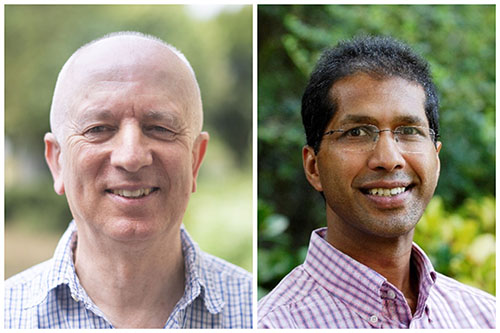The recipients of the grants Professor Anthony Davis and Professor Varinder Aggarwal from the School of Chemistry are both leaders in their fields.
Professor Davis gained a B.A. in Chemistry from Oxford University in 1977. After positions at the ETH Zürich and Trinity College, Dublin, he moved to the University of Bristol in 2000, where he is Professor of Supramolecular Chemistry.
In 2002 he was awarded the Tilden Medal of the Royal Society of Chemistry, in 2015 the RSC Award for Physical Organic Chemistry, and in 2020 the RSC Robert Robinson Award. He is currently Chair of the Editorial Board of Organic and Biological Chemistry.
Professor Davis will receive funding for his project After GluHUT – A New Era for Synthetic Carbohydrate Receptors (POSTGLUHUT) which aims to transform the lives of diabetics.
Molecules which bind carbohydrates can have a range of medical uses. An important example is the application of glucose-binding molecules in glucose monitors for diabetics, and potentially in glucose-sensitive insulin which becomes more active as glucose levels increase.
His group recently developed a glucose-binding molecule called “GluHUT” (Glucose-binding Hexaurea Temple) which turns out to be remarkably effective
This ERC-funded project, “POSTGLUHUT”, aims to exploit GluHUT in a number of new ways, and also to develop the underlying science so that other carbohydrates can be targeted.
Professor Davis said: “This grant offers an exciting opportunity to build on the success of our glucose-binding molecule ‘GluHUT’. It gives us the resources we need to make the most of GluHUT itself, and to move towards ‘synthetic antibodies’ binding a range of medically important carbohydrates.
“Ultimately we hope to improve the lives of diabetics, and to develop a range of other medical applications through binding to the carbohydrate units which control many biological processes.”
Professor Aggarwal studied chemistry at Cambridge University and received his Ph.D. in 1986. After postdoctoral studies at Columbia University, he returned to the UK as a Lecturer at Bath University. In 1991 he moved to Sheffield University, where he was promoted to Professor in in 1997. In 2000 he moved to Bristol University where he holds the Alfred Capper Pass Chair in Chemistry. He was elected Fellow of the Royal Society in 2012.
Professor Aggarwal was selected for the award, his third ERC Advanced Grant, for his project: Conformation, Automation and Applications of Polyborons in Synthesis (COOLIES).
The grant is a broad ranging program which includes trying to automate the complex field of organic synthesis using boron chemistry as a key component to facilitate C-C bond-forming reactions and an investigation into a new codon language employing boron to create molecules for information storage and retrieval.
He said: “I am really excited about being awarded this ERC grant. The longer-term funding for ambitious projects that ERC provides, will enable us to explore the potential to short circuit complex organic syntheses, and even automate them. This should enable pharmaceuticals to be made more easily and with lower cost. The field of information storage and retrieval has been dominated by silica-based materials which take up considerable space. Using single molecules for information storage and retrieval has the potential to miniaturise this considerably. Our ERC grant will enable us to explore what is possible.”
The European Research Council (ERC) has announced the awarding of 218 Advanced Grants to outstanding research leaders across Europe, as part of the Horizon Europe programme. The grants - totalling €544 million - support cutting-edge research in a wide range of fields, from medicine and physics to social sciences and humanities.
Maria Leptin, ERC President, said: “"These new ERC Advanced Grantees are a testament to the outstanding quality of research carried out across Europe.
“We look forward to seeing the results of the new projects in the years to come, with many likely to lead to breakthroughs and new advances.”
